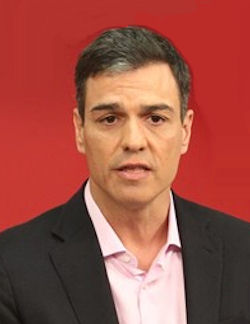Pedro Sanchez
 The leader of the socialist PSOE party, Pedro Sanchez, became the designated prime minister of Spain after the government of Mariano Rajoy was ousted in a vote of no confidence. Sanchez filed the motion following a corruption scandal involving Rajoy's center-right People's Party (PP). It likely spelled a new era for the EU's fourth-largest economy which had been ruled by Rajoy's conservatives since 2011. During his time in opposition, Sanchez — a former economics professor — harshly opposed spending cuts imposed by the conservatives and pledged to extend welfare rights.
The leader of the socialist PSOE party, Pedro Sanchez, became the designated prime minister of Spain after the government of Mariano Rajoy was ousted in a vote of no confidence. Sanchez filed the motion following a corruption scandal involving Rajoy's center-right People's Party (PP). It likely spelled a new era for the EU's fourth-largest economy which had been ruled by Rajoy's conservatives since 2011. During his time in opposition, Sanchez — a former economics professor — harshly opposed spending cuts imposed by the conservatives and pledged to extend welfare rights.
Sanchez promised to open talks with the Catalan government in the independence dispute which saw Madrid launch a violent crackdown and separatist leader Carles Puigdemont flee the country. Additionally, Sanchez urged constitutional reform to set up a federalist system that would keep Catalonia in Spain. However, the socialist leader also appeared with Rajoy on television in May, confirming the state's right to intervene if Puigdemont's successor Quim Torra violated the constitution. In May 2018, he slammed Torra as the "Le Pen of Spanish politics," referring to far-right French leader Marine Le Pen.
Despite criticizing austerity, Sanchez expressed no skepticism on the EU's monetary union or Madrid's EU membership. He has also pledged to abide by a national budget recently negotiated by Rajoy, assuaging fears of economic instability in the EU. Sanchez first became PSOE chief in 2014, but was ousted by a rebellion within his own party ranks in 2016 for refusing to allow Rajoy's Popular Party (PP) to form a government. At the time, Sanchez said the PP was too corrupt to run the country. He regained the leadership of the 140-year old PSOE in May 2017. In the wake of the corruption scandal, hecalled on Rajoy to resign and avoid being the first Spanish prime minister to lose a no-confidence vote.
"Your time is up," Sanchez said. "You are part of the past, of a chapter the country is about to close." Rajoy hit back by saying Sanchez was trying to peace together a "Frankenstein" government from various political fractions and reminded the lawmakers Socialist had lost two general elections under Sanchez.
Born in 1972 in Madrid, Sanchez grew up in a wealthy family -- his father an entrepreneur and his mother a civil servant. He studied in the Spanish capital before getting a Master's degree in political economy at the Universite libre de Bruxelles in Belgium. Politics, though, was always his passion.
Sanchez first joined the PSOE in 1993 and worked as a political adviser in the European Parliament and at the UN during the Kosovo war. He became a councilor on the Madrid City Council in 2004, then a member of the Spanish Congress of Deputies for Madrid in 2009. He entered parliament as a lawmaker under Prime Minister Jose Luis Rodriguez Zapatero's administration. Voted out in 2011, he finished his economics doctorate before returning to Congress in 2013.
The Congress of Deputies voted by absolute majority 01 June 2018 the motion of censure that the Socialist Group had presented to the Executive of Mariano Rajoy. In this way, Pedro Sánchez has become the seventh president of the Government of Spain. After being invested Chief Executive, Pedro Sanchez has declared to the media that he is aware of both the responsibility he assumes and "the very complex moment our country is going through." Sanchez also stressed that will address "all the challenges" that the country has raised "with humility," "with dedication," "with much determination to transform and modernize" the country and "to address the many social urgencies of many people who suffer precariousness and inequality".
The Socialist party had remained "on the sidelines of the frontline of political debate" which grouped together the PP, centre-right party Ciudadanos and far-left grouping Podemos. With just 84 lawmakers in the lower house, Sanchez has been forced to forge deals with Podemos, Catalan separatists and Basque nationalists to oust Rajoy. Slammed as a "Frankenstein majority" by the PP, it will be very unstable and could cut short Sanchez's time as prime minister.
|
NEWSLETTER
|
| Join the GlobalSecurity.org mailing list |
|
|
|

